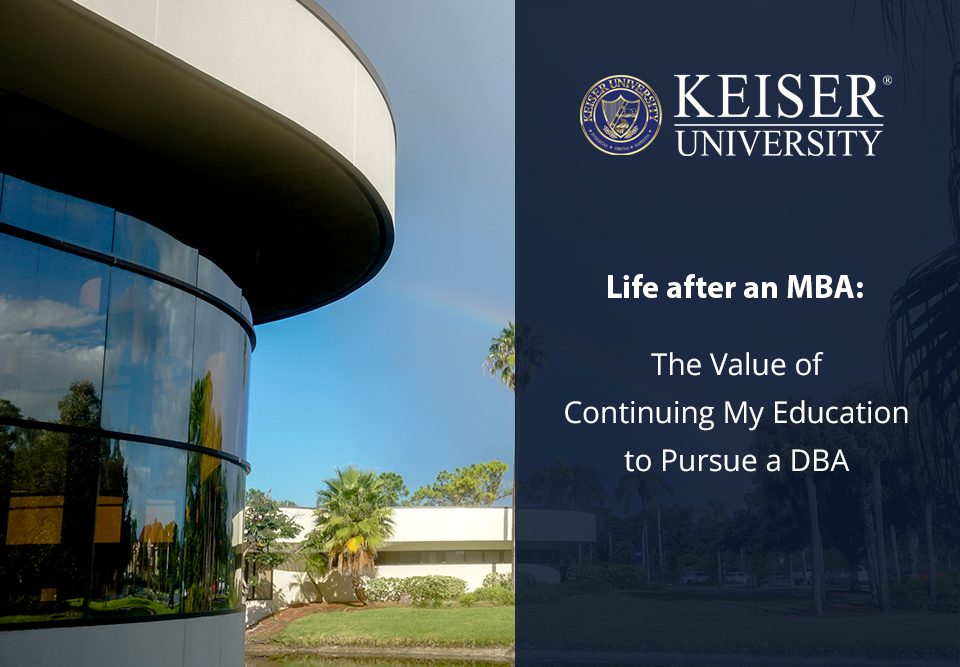If you’re looking to take your business education to the next level, it may be time to explore advanced business degree programs to suit your needs. And if you already have a bachelor’s degree in business or a related field, the next logical step may be a Master of Business Administration (MBA) or eventually continuing on to a Doctor of Business Administration (DBA).
With that said, there are some crucial differences between a DBA and MBA to be aware of—especially in terms of program length, curriculum and outcomes. By understanding the ins and outs of each degree option, you can better determine whether one (or both) of these types of business administration programs is right for you.
What Is an MBA Degree?
A Master of Business Administration degree is a business degree program at the graduate level. Generally, this focuses on expanding a student’s business knowledge in such areas as management, technology, marketing, budgeting and more. This type of program is a typical progression for those with business-related undergraduate degrees who want to increase their earning potential or strive for career advancement in their professional lives.
Degree Purpose
For most students, the MBA is a practical degree that’s meant to help them achieve new levels of career goals that simply may not be possible with a bachelor’s degree alone. Because MBA programs are often focused on teaching students practical, real-world skills that can be applied to the business world, the purpose of this degree is to help you become a more educated and knowledgeable business professional.
Required Experience
While no two MBA programs will be exactly alike, the general admission requirements tend to be similar from one school to the next. Usually, applicants to an MBA program must have an undergraduate degree in business or a related field to be considered for admission. In some cases, those with lower GPAs in their undergraduate studies may also need to have a certain level of professional experience under their belts in the field of business. Some schools may also require applicants to take the Graduate Management Admission Test (GMAT) exam prior to applying.
Program Length
Most MBA programs are designed to be completed within two years, but various factors can affect how long it takes you to complete an MBA program, including whether you’re enrolled part or full time as well as the number of credit hours required to graduate.
Curriculum
The curriculum of an MBA program can vary from one school to the next, particularly if there are concentrations or specializations offered. In general, however, an MBA will include courses in the following topics:
- Financial management
- Marketing management
- Operations management
- International business
- Decision-making
- Business research
Degree Cost
The cost of an MBA degree can vary widely depending on the specific program in which you enroll. On average, an MBA costs around $55,000. Fortunately, there are ways to make paying for an MBA easier, such as receiving transfer credits or enrolling in online or hybrid class options. Likewise, financial aid may be available in the form of scholarships
What Is a DBA Degree?
A doctorate in business administration is generally considered the highest level of education that you can attain in the field of business. Most people who go into a DBA program are interested in teaching business themselves—though it is also possible to work in any number of business-related professions with a DBA.
A DBA program is usually more concentrated on business theory and research as opposed to practical skills, making this an ideal option for those who wish to become business scholars themselves.
Degree Purpose
Many students pursuing a DBA wish to do more than just work in the business field; they want to become business scholars who study the nuances of the field and reach new levels of understanding. With greater attention to theory than practice, a DBA program prepares students for a lifetime of learning and exploration within the business field—as well as potential teaching positions as professors and adjuncts.
Required Experience
While an MBA is not strictly needed to pursue a DBA, it is necessary to complete your school’s particular prerequisites to do so, which most often entails an MBA.
Typically, students applying for a DBA program already have a graduate degree like an MBA from an accredited institution. Some schools may also require applicants to have maintained a certain grade point average (GPA) in a previous MBA or similar program, but this is not always the case. In addition, it is possible students will need a certain amount of professional experience working in the business field before applying, although this varies from program to program.
Program Length
Most DBA programs are designed to be completed within two to four years, yet the length of time it will take to graduate depends on many factors including whether you receive transfer credits as well as part- or full-time enrollment. The frequency with which classes are offered (including spring/summer course availability) can also impact how long it takes you to obtain your DBA degree. In general, most DBA programs will consist of about 60 credit hours.
Curriculum
The curriculum of a DBA program tends to be focused on career opportunities in higher education and business leadership, with common courses covering such topics as:
- Business research writing
- Global business and economy
- Financial theory and policy
- Management and leadership
- Quantitative and qualitative research
- Business research and publication
A DBA program may include residencies as well as a dissertation, but this can vary from one program to the next.
Degree Cost
The cost of a DBA will depend on the price per credit hour and other fees charged by the program of your choice. It is not uncommon for the total cost of a DBA to exceed $50,000, though financial aid and other flexible payment options may be available.
Tamara McQueen: Advancing Her Career with a Global Business Doctorate

Differences Between a DBA and an MBA
What exactly is the difference between an MBA and DBA, anyway? Ultimately, it boils down to the timeline, focus and outcomes of each program. Plus, an MBA is something students would be wise to earn before considering a DBA.
An MBA is tailored toward business professionals looking to expand their skill sets and qualify for higher-paying jobs in the business field (including managerial and leadership roles). With this in mind, the MBA curriculum tends to emphasize teaching practical leadership, budgeting, finance and similar skills.
A DBA program, on the other hand, is more geared toward those interested in teaching business at the college level or becoming business research scholars. As such, these programs often focus more on business theory, research methods and publication.
An MBA and DBA vary in program length, as an MBA typically takes just two years or less to complete, whereas a DBA can take up to four years. Because a DBA requires more credit hours, this type of program also tends to be more expensive than an MBA program.
Similarities Between a DBA and an MBA
Of course, there are some similarities to consider between a DBA and MBA program. Both are graduate-level programs that are geared toward business professionals looking to take their careers to the next level. Many of these degree programs also offer both online and in-person or hybrid models of learning to accommodate students’ busy work and personal lives. Both MBA and DBA programs may even cover coursework on similar topics, including management strategies and business research.
Career Advancement
No matter if you opt for an MBA or DBA, it’s likely that your primary goal in seeking a graduate degree in business is to advance your career. If you’re pursuing an MBA, career advancement may look like a role as a business leader or manager. However, if you’ve already been working as a business leader for some time and are more interested in the research and academic side of the industry, then a DBA may be an ideal next step for your career.
Job Opportunities With an MBA
The possibilities for career advancement with an MBA degree are expensive, with numerous graduates going on to work as department heads, operations managers, business leaders and even C-level executives. With the deep understanding of business that you’ll gain from an MBA program, you can be prepared to work as a business leader in just about any industry imaginable. Meanwhile, you’ll be able to put your critical thinking, decision-making and leadership skills to use in your everyday work.
Job Opportunities With a DBA
Graduates from DBA programs have typically already completed an MBA, so they are qualified for any jobs that an MBA graduate could work. However, with the research- and theory-based curriculum of a DBA under your belt, you could also explore career opportunities in business consultation, corporate business leadership, strategic business planning and higher education.
So, which degree(s) makes the most sense for you? If you plan to continue working in the business field and are simply seeking more practical skills you could use in your everyday work, an MBA is probably the most logical progression. On the other hand, if you aspire to someday teach or study business for a living, a DBA may be the better option. Keep in mind that, because most DBA programs require an MBA as a prerequisite, you may need to complete an MBA before you can pursue the most advanced degree in business.
Regardless of the path you decide to take, choosing the right program is crucial to your long-term success. When searching for an MBA or DBA program, be sure to look for experienced faculty and flexibility in your scheduling. Ideally, you’ll be able to find a program that offers some or even all of your MBA or DBA courses online. Likewise, because advanced degrees can be costly, finding a program that offers dedicated financial aid support is a must.
Ready to Learn More About an MBA or a DBA?
Whether you’re interested in an MBA or DBA, Keiser University has advanced business degree options to suit your long-term professional goals.
Our MBA program (also available in Mandarin or Latin) is offered online, on campus and in hybrid formats to suit your busy schedule and can be completed if attending full-time variety of concentrations to suit your interests, too, including specializations in management, marketing and technology management. Looking to pursue your bachelor’s degree and MBA within the same program? Check out our accelerated BA to MBA fast-track program!
DBA Program and Prerequisites
Additionally, beyond an MBA, you may later decide to round out your educational journey with our DBA program—which is offered exclusively online for your convenience and can be completed in as little as three years contingent on factors such as course availability, transfer of credit, residency and dissertation completion.
However, it’s important to note that you won’t be able to begin pursuing your DBA at Keiser University’s business school without first holding an MBA or another advanced degree that fulfills the proper prerequisites. This includes either:
A relevant master’s or doctoral degree from an accredited institution, OR Completion of Keiser’s prerequisite courses (for those who do not meet prior credit requirements or who have a GPA less than 3.0).
Learn more about these business programs and other opportunities offered at Keiser University by getting in touch with an admissions counselor today.






 The instructors at Keiser University impacted my life. They believed in my ability to become a great graphic designer, regardless of how I felt about my skills. KU helped to prepare me for the real world and got me to where I am today.
The instructors at Keiser University impacted my life. They believed in my ability to become a great graphic designer, regardless of how I felt about my skills. KU helped to prepare me for the real world and got me to where I am today.
